How AI is unlocking rental fleet efficiency
06 November 2024
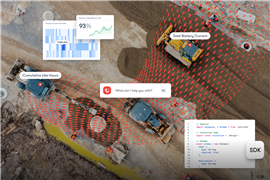 Graphic showing the capabilities of Trackunit’s IrisX operating data platform. Photo: Trackunit
Graphic showing the capabilities of Trackunit’s IrisX operating data platform. Photo: Trackunit
As any fleet owner will undoubtedly know first-hand, managing fleet from the initial order through to the end of its lifecycle requires meticulous planning and considerable resources.
It’s a costly process, but necessary to ensure seamless solutions are provided to users and internal productivity is upheld.
Now, with the increasing adoption of software and Artificial Intelligence (AI), fleet owners are able to streamline the fleet management process, enabling them to reduce downtime, better plan for maintenance and provide customers with a better service.
While still in its early stages in terms of adoption, a number of players are providing AI to the rental sector, albeit to a lesser extent than some other industries.
According to German software company Sycor, the “relatively conservative nature of the industry” could point to why investments have not yet been made on a large scale.
However, the company is of the belief that there are several areas in which AI can act as a “transformative force” for the rental sector.
“AI can revolutionise operations, enhance customer service and drive growth,” the company tells IRN. “Its potential to improve operational efficiency is particularly promising, with applications in demand forecasting, dynamic pricing, workflow automation and customer management. However, when these areas are broken down into specific use cases, the results often become highly individualised due to varying criteria and technological challenges.”
It adds that one key area for the industry could be predicting the return of rented assets, with AI able to help estimate the expected quantities and return locations of rental assets at a specific point in time through the use of historical data.
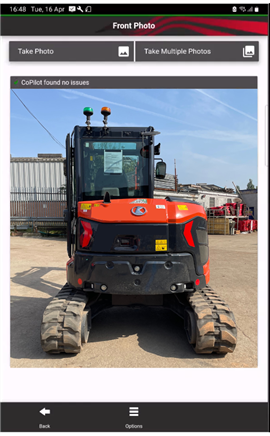 The PHALANX mobile CoPilot validating a well-taken image of rental equipment. Photo: Spartan Solutions
The PHALANX mobile CoPilot validating a well-taken image of rental equipment. Photo: Spartan Solutions
‘Co-pilots’ for rental
A key factor in that is analysing data such as customer behaviour, seasonal trends and potentially the type of construction project involved, the company says.
The next logical step, it adds, is to optimise the dispatching process to save time and reduce transportation costs.
While some companies are just getting to grips with AI, others have been in the game for quite some time.
Take Scotland-based technology firm Spartan Solutions, which has been working with AI specialists at its local university for more than five years and has already supplied AI-based tools to clients.
Previously it has created a predictive maintenance solution, PROPHES, for the offshore oil and gas sector which is now making its way to the rental sector.
The three ‘co-pilots’, which can be embedded within Spartan’s Apps, will help companies manage the quality of images taken of equipment and validate if they are correct, provide a predictive maintenance tool and improve text communications in its workshop and fleet management functions.
Key to making this happen, says Spartan’s COO John Glen, is the development of freely available AI ‘transformers’ – that’s the ‘T in GPT (Generative Pre-trained Transformers) – which are machine learning routines that can be used for a wide variety of tasks, including to analyse and generate text, create Q&A bots, assess images, and more.
In terms of its image quality feature, the co-pilot will help control the quality of photos of equipment that workshop staff and drivers take before and after deliveries.
“The first thing we did is build an AI engine that checks the quality of the photograph at the point of capture to make sure you’re taking the right photograph”, says co-founder Glen.
“We’ve programmed the co-pilot to say, is this an image of construction equipment? It can effectively reject a photo at the point of capture and say, I’m not going to let you use that picture.”
The system will alert users if a photo is not of sufficient quality, the aim being to prevent disputes around damage.
As for its second co-pilot, it will help companies to analyse text and data manually entered and help make sure that materials are professional and suitable for wider display.
This ensures that the human element of the process is maintained, while the co-pilot acts as a quality check system to validate the data, flagging anything that falls below a certain standard in the process. Staff will then be asked whether they want to accept the suggested change.
Product personalisation
The third co-pilot is based on predictive maintenance and uses an older version of AI based not on algorithms and machine learning, but on expert rules.
“AI is a fairly large universe”, says Glen, “Machine learning is a subset of AI, but there’s another subset called expert rules. Expert rules are basically forward-chain propagation – what you can do is you can chain ‘if then else’ statements together so that you take the input, you run through these various chains of logic gates, and the output is either do nothing or do something.”
He gives the example of a pump rental application and chemical dozing of a water supply: if you know the client’s requirements, the dozing required and have telematics monitoring in place, you can set a chain of rules and then create messaging to personnel if certain conditions occur.
“We set up a rule that says, okay, monitor the telematics stream and when the chemical output meter gets within 5% of the licensed amount, then create an emergency predictive maintenance event that basically means that we have to either send an engineer out to turn off or turn down the pump, or we contact the client.”
While some platforms focus on the specifics of fleet, others focus on improving experience and efficiency.That’s the case for STAEDEAN (formerly To-Increase), which launched its Product Recommendation Engine (PRE) last year with a view to boost the operational efficiency of equipment rental companies.
PRE uses AI and machine learning to analyse customer data and offer personalised product recommendations based on past purchases. It can also recommend supplementary products to customers based on previous buying patterns, behaviours and preferences.
The company says that this ensures the buying process “more intuitive and efficient” for customers.
Another area STAEDEAN is focusing on is extending the capabilities of Microsoft Copilot for its equipment rental solution embedded in Microsoft Dynamics 365 Finance & Supply Chain Management (F&SCM).
The company tells IRN that Microsoft’s Copilot, a chatbot with search, reporting, and task execution capabilities, plays a critical role in its AI strategy for equipment rental customers.
STAEDEAN has integrated its Rental Management solution into Microsoft Dynamics 365 F&SCM, which it says gives users full access to all the powerful features of the D365 ERP, including Microsoft Copilot, to achieve greater efficiency and productivity.
That, it says, means rental customers can stay up to date with the latest Microsoft releases and automatically access new features as they become available. With Copilot, companies can initiate productivity improvements, which will ease the workload and decrease the number of repetitive tasks.
Additionally, it also offers predictive analytics that can forecast demand, optimise asset management, provide actionable insights and “empower equipment rental companies to make informed business decisions.”
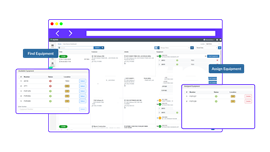 Wynne Systems is currently developing voice-to-transaction AI functionality for the existing e-commerce platform, RenterLink. Photo: Wynne Systems
Wynne Systems is currently developing voice-to-transaction AI functionality for the existing e-commerce platform, RenterLink. Photo: Wynne Systems
Transaction benefits
Elsewhere, US-based Wynne Systems is developing voice-to-transaction AI functionality for its e-commerce platform, RenterLink. Voice to transaction is the first function being built into its AI platform, and it will be leveraged across multiple applications, including RenterLink, Customer Portal, RMUI, and MobileLink.
The company says it will provide benefits to both rental teams and their customers, facilitating faster and easier rental transactions by helping the customer find the right equipment for the job, making it easy for operations staff to find what they’re looking for.
It added that it can help to “mitigate the pains that stem from labour shortages and high turnover positions by making software easy to learn and use.”
The AI capability, set to be released in late Q1 or early Q2 of 2025, will be the first of many AI developments, the company says.
Throughout 2025, Wynne will be focused on continued development in the space by enhancing existing solutions with true AI capabilities. It tells IRN that the goal of the project is to “further empower RentalMan’s end users with software tools that add speed, efficiency, and even predictability to their daily tasks in rental operations.”
The company says that among the future capabilities it is analysing includes the constant optimisation of order management based on real-time input, rental marketing via pitching equipment to customers based multiple factors, user assistance and image recognition.
Generative AI features
Another company not new to AI is Denmark-based machine telematics and data specialist Trackunit, which is adding generative AI to its Iris operating platform as part of an upgrade to its IrisX offering.
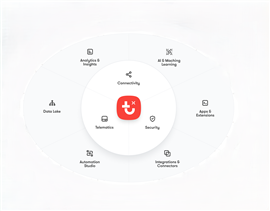 Photo: Trackunit
Photo: Trackunit
The company reveals that the platform, tailored to the off-highway segment of the construction industry and built on its existing Iris offering, allows customers to leverage generative AI and Large Language Models in a “dynamic, evolving and open environment” and will also allow for voice or text interrogation of machine data.
This means users can interact with machines as if they were human, according to CEO Soeren Brogaard.
“It’s a first release, so it still has its limitations”, he says, “but it’s very exciting because we are one of the very first, not just in construction but across the globe, that is launching a time series generative AI proposition.”
The technology provides an interface where the data acts as a co-pilot or advisor, as in ChatGPT, he says, “you can have a conversation almost like it was a human…You no longer have to be a developer to write these queries. IrisX will translate your question into code.”
Another AI feature of the system is the capability for customers to integrate their own AI-based tools and applications to analyse their own data.
“That’s a profound new thing”, says Brogaard, “So far, Trackunit has been using AI tools for our standard applications, but now we are also giving our customers that capability in a private, secure instance, so customers can unlock new insights.
“They can even put in their own data, and that allows them to build applications either for internal use or external use.”
Digital assistant
According to rental technology firm Alias2K, new technologies and AI are emerging as “powerful tools to streamline activity management, reduce time, and minimise errors, allowing rental companies to optimise their resources and focus on higher-value tasks.”
In the case of its newest launch, The Rental Expert, the company is aiming to help companies overcomes issues related to training new staff by providing them with a digital assistant that can accurately answers questions about the company’s rental process and owned equipment specifications.
Initially, the product is trained on general knowledge and all relevant information about the rental and construction equipment industry, while Alias2k also provides specific training tailored to individual companies, enabling The Rental Expert to better understand internal processes, documents, best practices, company policies and more.
It can also be integrated with a company’s systems, enabling further learning on fleet structure, pricing and equipment availability.
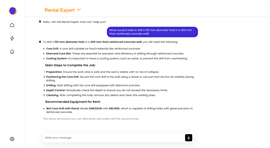 Rental Expert can accurately answer questions about the company’s rental process and owned equipment specifications. Photo: Alias2k
Rental Expert can accurately answer questions about the company’s rental process and owned equipment specifications. Photo: Alias2k
The company says that this creates a “highly effective digital operator that new employees at a rental company can rely on to independently and confidently learn everything they need to know about the company they’ve just joined.”
It added, “They can even relay specific customer queries to get the best possible response. The AI within The Rental Expert is designed to provide highly precise and detailed answers, just like a real expert in the construction equipment industry.”
Meanwhile, the Italy-based company also uses AI to automatically add documentation to its Piko platform, which is designed to manage documents related to equipment, including operating manuals, insurances and certificates of conformity.
The platform, launched this year, fully automates the process of reading and classifying documents related to construction machines and tools, replacing the need for manual work.
AI investment continues to drive growth in the AEC industry says new report
 In addition to AI, the report highlights broader trends in the adoption of digital tools within the AEC industry (Photo: AdobeStock)
In addition to AI, the report highlights broader trends in the adoption of digital tools within the AEC industry (Photo: AdobeStock)
Bluebeam, a provider of solutions and services for architecture, engineering, and construction (AEC) professionals, has released findings from its new report, Building the Future: Bluebeam AEC Technology Outlook 2025, which examines the latest technology and digitisation trends in the construction industry.
The report, based on a survey of AEC managers worldwide, highlights a significant investment in artificial intelligence (AI) by these companies. Nearly three-quarters (74%) of respondents indicated that they are currently using AI in one or more phases of their building projects. However, more than half (54%) of those utilising AI expressed concerns about AI regulation. Notably, 44% of these individuals stated that such concerns are affecting AI implementation within their organisations.
The report indicates that AI is particularly prominent in the design and planning phases of construction. Nearly half of AEC firms are utilising AI for design (48%) and planning (42%). Among companies that have adopted AI, more than half (55%) recognise it as being very important, and over 70% are allocating up to 25% of their budget to this technology. This investment is expected to grow, as the vast majority (84%) plan to increase their AI spending over the next five years.
In addition to AI, the report highlights broader trends in the adoption of digital tools within the AEC industry. Technology is most frequently used during the construction (77%), design (77%), and planning (74%) phases of building projects highlights the report. The most widely used technology is Building Information Modeling (BIM) at 69%, followed by Computer-Aided Design (CAD) at 54% and project management software at 53%.
The report also highlights that Architecture, Engineering, and Construction (AEC) firms face significant obstacles in adopting technology and digitization. A notable one is the lack of training and skills development among employees, with 32% of firms citing this as a major challenge. Other barriers include issues related to integration (27%) and technical difficulties (26%).
Despite these challenges, the use of digital tools has enabled construction firms to achieve substantial cost savings, with over a third (35%) of respondents reporting savings between US$100,000 and US$500,000 through new technologies.
“As digitisation and the use of AI within the AEC sector increases, reliance on outdated paper-based approaches will continue to shrink, helping to drive cost savings and improve sustainability efforts in construction,” said Usman Shuja, chief executive officer at Bluebeam.
Shuja added, “AI is already revolutionising the building process, so it is essential that educators, technology providers and construction industry leaders work together to produce new training initiatives that can capitalise on these innovations by helping bridge the AEC technology skills gap so we can continue to move the industry forward.”
STAY CONNECTED



Receive the information you need when you need it through our world-leading magazines, newsletters and daily briefings.
CONNECT WITH THE TEAM








